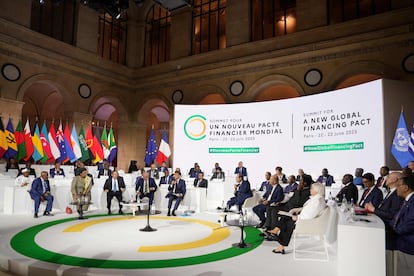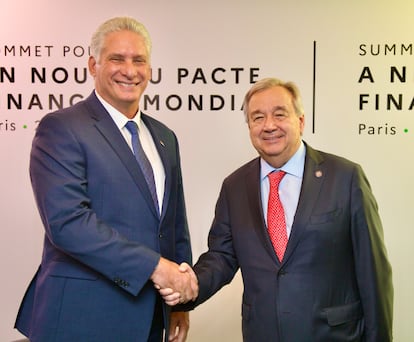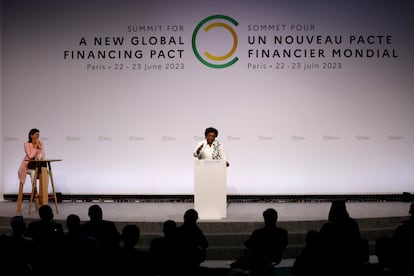The world is moving towards comprehensive financial reform, which includes nature and greater equity
The summit for a New Global Financing Deal marked an important milestone in global efforts to address the intertlinked crises of climate change, biodiversity and inequality

The summit for a New Global Financing Pact, held in Paris last week, marked an important milestone in global efforts to address the interlinked crises of climate change, biodiversity and inequality. The 40 participating countries agreed to work towards a reform of the financial system and the goal of raising $100 billion for climate financing this year — a commitment that was made by developed countries in 2009 and taken up more firmly at the 2023 summit, as it has never been fully accomplished.
The summit made it clear that the current global financial architecture is outdated, dysfunctional and unfair, as declared by the Secretary General of the United Nations, António Guterres, paving the way for a change in the tone of the global conversation on fundamental issues regarding debt, development, the impact of climate change and vulnerability — significant advances that a couple of years ago would have been unthinkable.
The transition towards a more equitable and resilient world requires enormous transformations in the financial architecture, which can provide long-term solutions. The summit showed that the world is indeed changing. Today there is recognition that the global institutional framework has enormous responsibility when it comes to achieving the goals of eradicating poverty, facing the impact of climate change and reducing greenhouse gas emissions — challenges that are intrinsically interlinked.

One of the most important points of the summit was to address the suffocating debt burden faced by many developing countries and to recognize the importance of debt rescheduling to promote economic stability and foster sustainable development. What’s more, there was recognition of the heavy toll that climate-caused or aggravated disasters — which are in many cases recurring — take on developing countries. The World Bank, as well as other financial institutions, will begin to incorporate clauses to deal with disasters, which means better conditions for debt payments agreed to in loans. These commitments mark a shift in north-south relations and will provide breathing space for nations, allowing them to redirect resources towards critical sectors such as healthcare, education, better management of natural resources and infrastructure projects.
Within this context, The Nature Conservancy (TNC) has been promoting innovative solutions that include debt-for-nature swaps. It has consolidated several cases of blue bonds, which allow countries to refinance their debts on more favorable terms and allocate the proceeds to biodiversity protection and climate adaptation. In Latin America, Belize is the first country to implement blue bonds to conserve the oceans, restructuring approximately $550 million of domestic commercial debt. The country will invest $180 million to conserve its ecosystems, which will allow it to fulfill its commitment to protect 30% of its ocean territory, develop governance frameworks for fishing, and regulate coastal blue carbon projects.

Similarly, Barbados, a country that has led the effort to reform the global financial framework, completed a $150 million debt conversion in 2022, with the support of TNC. This move will help the country expand its marine protected areas, up from virtually zero to around 30%, and will improve the management of all marine waters within its jurisdiction. The project is expected to free up approximately $50 million to support environmental and sustainable development actions in Barbados over the next 15 years, making both the country and the livelihoods of the people more resilient in the face of climate change.
It is also worth noting the need to include nature-based solutions in financial system reforms. During the summit, the development of “national packages” for forests and nature was supported through the Forest and Climate Leaders’ Partnership (FCLP); as well as via the ratification of financing for the Amazon Fund in Brazil. Additionally, a process will be promoted to study the development of biodiversity credit markets, whose evolution will have to be managed with great transparency and judgement.
That is why we are applauding the international efforts and commitments to achieve financial reform that recognizes the magnitude of the impact of global warming, as well as the importance of considerably increasing investments in nature to achieve a sustainable and fairer future. As world leaders adopt these commitments, it is hoped that they will translate into concrete action, with the understanding that the profound changes that are urgently needed cannot wait. 2030 is now, and we need to accelerate comprehensive change that advances equity and the long-term well-being of people around the world, which involves properly managing our natural resources. The reform of the financial sector is a fundamental element of this strategy.
Paula Caballero is Regional Executive Director of The Nature Conservancy for Latin America.
Tu suscripción se está usando en otro dispositivo
¿Quieres añadir otro usuario a tu suscripción?
Si continúas leyendo en este dispositivo, no se podrá leer en el otro.
FlechaTu suscripción se está usando en otro dispositivo y solo puedes acceder a EL PAÍS desde un dispositivo a la vez.
Si quieres compartir tu cuenta, cambia tu suscripción a la modalidad Premium, así podrás añadir otro usuario. Cada uno accederá con su propia cuenta de email, lo que os permitirá personalizar vuestra experiencia en EL PAÍS.
¿Tienes una suscripción de empresa? Accede aquí para contratar más cuentas.
En el caso de no saber quién está usando tu cuenta, te recomendamos cambiar tu contraseña aquí.
Si decides continuar compartiendo tu cuenta, este mensaje se mostrará en tu dispositivo y en el de la otra persona que está usando tu cuenta de forma indefinida, afectando a tu experiencia de lectura. Puedes consultar aquí los términos y condiciones de la suscripción digital.








































